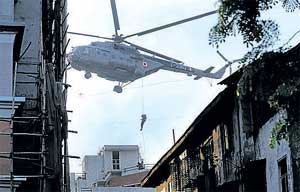Imprisoning Palestinian Women
| Neve Tirza in Ramleh is currently the only specialized women’s prison facility in all of Israel. While many women have been detained there since the wave of arrest, which accompanied events following September 2000, in a special section devoted for what Israel calls “security prisoners”, no Palestinian women are held there at the moment. Instead, all of them are imprisoned in old jails, dating back to the British Mandate period (1922- 1948) and lack modern day infrastructure. Most importantly, these facilities have been designed for men and by men and rarely do they meet women’s needs. [Aseerat] |
A July 2008 Fact Sheet Series titled, "Behind the Bars: Palestinian Women in Israeli Prisons" was jointly prepared by the Addameer Prisoner Support and Human Rights Association, the Palestinian Counseling Center (PCC), and Mandela Institute. Along with background information, it covered Israel's obligations under international law, prison conditions where they're held, medical neglect, and their educational rights restricted or denied.
Relevant International Laws Protecting Prisoners and Civilians in Times of Conflict, Including Women
The 1949 Third Geneva Convention applies to prisoners of war, replacing the 1929 Prisoners of War Convention. It broadened the categories of persons entitled to prisoner of war status and precisely defined the conditions and places of their captivity - especially with regard to allowed labor, financial resources, required treatment, and rules of judicial proceedings.
It specifically prohibited acts of:
-- "Violence to life and person, in particular murder of all kinds, mutilation, cruel treatment and torture;
-- Outrages upon personal dignity, in particular, humiliating and degrading treatment;" and
-- judicial guarantees "recognized as indispensable by civilized peoples."
The 1955 UN Standard Minimum Rules for the Treatment of Prisoners requires "no discrimination on the basis of race, color, sex, language, religion, political or other opinion, national or social origin, property, birth or other status."





























